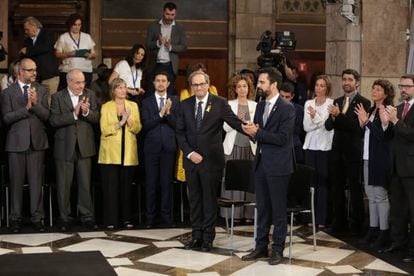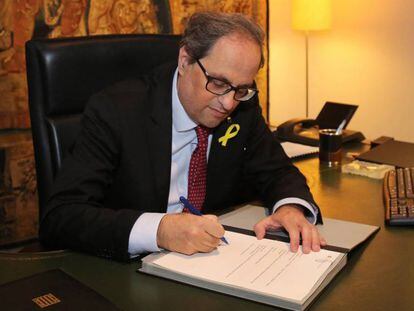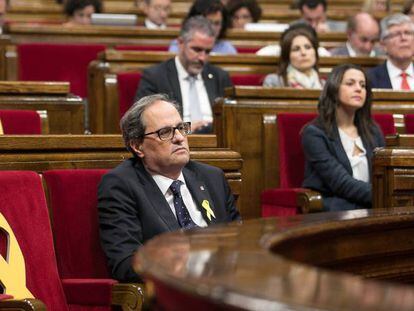New Catalan government sworn in, paving way for suspension of direct rule
New regional premier Quim Torra turns ceremony in Barcelona today into homage to the politicians currently in jail or who fled Spain to avoid arrest


The new members of the Catalan regional government officially took office on Saturday, the same day that Spain’s seventh prime minister, Pedro Sánchez, was also officially sworn into his role.
The premier of Catalonia, Quim Torra, used the occasion to pay homage to the pro-independence political leaders who have either fled the country to evade arrest, or are currently being held in pre-trial custody, over their role in last year’s unilateral declaration of independence.
During the ceremony, Torra restated his intention to “advance toward the construction of an independent state”
During the ceremony, which took place in the Palau de Generalitat, the palace in Barcelona that is home to the presidency of the regional government, Torra restated his intention to “advance toward the construction of an independent state,” and called on new Prime Minister Pedro Sánchez to begin a dialogue so that the current situation in Catalonia does not last “a single day more.”
The northeastern Spanish region saw its autonomous powers suspended late last year, in the wake of the illegal independence region held there and the subsequent declaration of independence that was passed through the Catalan parliament. In response, the Popular Party (PP) government of now ex-Prime Minister Mariano Rajoy triggered Article 155 of the Constitution, allowing for Madrid to take control of the region’s governance, while the key politicians behind the pro-independence drive were subject to arrest by the Spanish authorities. Some, such as Catalan Republican Left (ERC) president have been held in custody since November ahead of trial, while others, such as former regional premier Carles Puigdemont fled the country. Puigdemont is currently in Germany awaiting possible extradition to Spain.
Saturday’s ceremony went ahead after Torra changed his original picks for his Cabinet, having initially included figures who were either jailed or had left Spain. The central government in Madrid blocked those choices by refusing to publish their names in the Catalan official gazette, Diari Oficial de la Generalitat de Catalunya (DOGC), effectively preventing the new Catalan government from taking office.
Torra, a hard-line separatist who views himself as a stand-in for ousted ex-premier Carles Puigdemont, had drafted a list of Cabinet members that included Lluís Puig and Toni Comín, who are fugitives from justice, and Jordi Turull and Josep Rull, who are in custody awaiting trial over rebellion and misuse of public funds.
Saturday’s ceremony went ahead after Torra changed his original picks for his Cabinet, having initially included figures who were either jailed or had left the country
However, earlier this week, Torra reshuffled his Cabinet lineup, replacing four candidates under investigation for their role in the unilateral independence drive and paving the way for an end to direct rule in the region by Madrid.
Saturday’s ceremony was a constant choreography in homage to the politicians who are either in custody or abroad, and to their families, who were sat in the front row of the Sant Jordi hall where the event took place.
The formation of the government now implies an end to the intervention of the regional administration, which began on October 27.
As was the case when Torra himself took office, there was no mention during the ceremony of the Spanish Constitution. The premier asked his new ministers: “Do you promise to loyally comply with, in accordance with the law, the obligations of the role that you are taking on in the service of Catalonia and with loyalty to the president of the Generalitat?” the latter being the name of the regional government in Catalan.
There were also no symbols from the Spanish state on display, with a portrait of Spain’s King Felipe VI covered with a black curtain.
In his speech, Torra invited Sánchez to “talk,” to “take risks,” and to negotiate “government to government.” He also expressed his “complete willingness to enter into dialogue,” something he said was “essential to resolve conflicts in the way they do in the civilized world.”
In his speech, Torra invited Sánchez to “talk,” to “take risks,” and to negotiate “government to government”
During the ceremony, a family member of each of the politicians Torra had picked, but whose appointment had been blocked by the central government, read out a letter in which they “renounced” taking on the role but gave thanks for the “gesture of restitution.”
As each new minister was sworn in, they went over to greet one of the family members.
No representatives from the conservative Popular Party (PP), nor center-right Ciudadanos – both of which are fiercely opposed to the independence drive in Catalonia – were present at the ceremony.
Ciudadanos stated that they would not be attending given that the Catalan premier had said that the yellow ribbon – being displayed by pro-independence supporters as a symbol for the jailed politicians – is the symbol that represents his government, and that, the party stated, meant the exclusion of the half of Catalans who are opposed to independence.
The Ciudadanos leader in Catalonia, Inés Arrimadas, said that her party “cannot accept” a regional government that “is not of all Catalans” and that “only thinks about” those who wear the yellow ribbon.
English version by Simon Hunter.












































